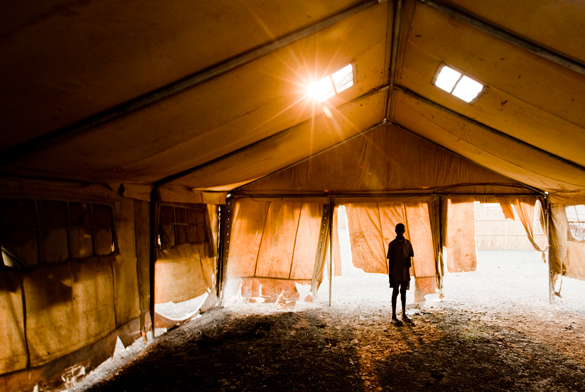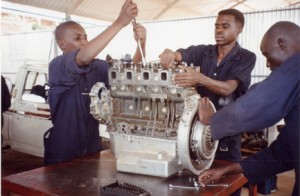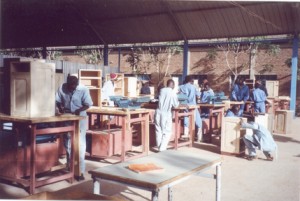MIDDLE EAST & NORTH AFRICA: Protecting Education for Children in Conflict

(MissionNewswire) While steady progress has been made in changing attitudes toward education and raising enrollment numbers during the past 10 years, violence and instability in the Middle East and North Africa is preventing children from getting an education. One in four youth are either out of school or at at risk of dropping out, according UNICEF.
“At a time of such change and turmoil, this region simply cannot afford to let 21 million children fall by the wayside,” said Maria Calivis, regional director for UNICEF MENA (Middle East and North Africa), said in a statement from Beirut.
“These children must be given the opportunity to acquire the skills they need through education in order to play their part in the region’s transformation,” she added. According to a joint report released by UNICEF and the UN Educational, Scientific and Cultural Organization (UNESCO), a 40 per cent reduction in the number of out-of-school children in the MENA region over the past decade provided hope and opportunities for millions.
According to the report, 12.3 million children and young adolescents in the Middle East and North Africa are out of school. In addition, according to recent calculations, more six million children and young adolescents are at risk of dropping out.
An additional three million children are out of school in Syria and Iraq, where conflict has destroyed large parts of the education system. As the violence expands, millions more are at risk of becoming a ‘lost generation’ deprived of the knowledge and skills needed to be successful adults.
Working to provide a safety net for youth in situations like this is the focus of the Salesians of Don Bosco, which operates schools, youth centers and humanitarian aid programs in some of the countries outlined in the report (as part of the more than 130 countries they serve).
“All youth deserve a chance at a better life,” says Father Mark Hyde, executive director of Salesian Missions, the U.S. development arm of the Salesians of Don Bosco. “Salesian schools help youth overcome barriers to success while teaching them how to take responsibility for their own lives. By providing youth an education and the necessary skills to find and retain employment, they are able to support themselves and help their communities.”
SYRIA
In Syria, Salesian missionaries continue to provide for Syrian youth and families in need at three centers. Each of the three centers is staffed by three Salesian priests and a deacon and have been in operation since well before the start of the war providing educational classes, meeting space and social development and sporting activities to youth and their families. The centers also offer trauma counseling, emergency shelter, nutritious meals and medical referrals to those in need.
“We are carrying on with our regular activities and every Friday, close to 300 boys and girls from elementary school through high school attend classes,” says Father Munir El Rai, Provincial of the Middle East. “The number of young people connecting with Salesian centers in Syria is increasing. One of the reasons is our youth center has been relatively safe so far compared to other parish youth centers.”
“However, in February our area was hit by five mortars, three of which fell within 50 meters of the school,” adds Fr. El Rai. “Nine civilians were killed, including four young people, and more than 35 people were injured. All citizens of Aleppo are at risk and no area is completely safe or far from war.”
Despite the ongoing violence, Salesian centers continue to meet the needs of their communities through the distribution of food, economic aid and scholarships to help young people continue with their schooling. Salesian missionaries have noted the absence of youth in the area due to many fleeing to safety in other areas of Syria and in neighboring countries.
Salesians have been helping Syrian refugees in Turkey, Lebanon and Egypt since early 2012, where each day they assist between 400 and 800 refugees, many of whom are women and children. At these refugee sites, Salesians provide emergency relief by meeting basic needs and providing shelter, safety and medical assistance. Salesians also offer technical skills training to assist refugee families with finding stable employment in their new host countries. This is urgently needed as individuals find it challenging to locate long-term formal employment, or draw on established social and professional networks, as a result of evacuation and host country labor laws.
“Salesians are particularly focused on providing care and support services to urban refugees,” says Neill Holland, program officer at the Salesian Missions Office for International Programs. “Urban refugees, like those fleeing Syria and other areas, are particularly vulnerable to economic insecurity, subject to long-term unemployment and high costs for basic necessities like shelter and food. What’s more, urban refugees intent on joining host country commerce out of the need to support dependent family members, often despite host country labor laws, are significantly at risk of exploitation and compromising situations.”
Salesian missionaries are also caring for more than 400 Syrian refugees in Turkey.
 SUDAN
SUDAN
Several other countries around the region are experiencing armed conflicts or political turmoil that prevents children from learning, according to the join report.
Sudan, for example, has both the largest number and the highest rate of out-of-school children in the region. Some 3 million children between the ages 5 to 13 are out of school, including 490,67 35-year-olds who should be in pre-primary (50 percent), 1,965,068 primary school aged children (37 percent) and 641,587 lower secondary school aged children (40 percent).
The report also states that 15 percent of primary school children are at risk of dropping out before the final grade of primary school.
At particular risk of being excluded from school are: girls, children affected by war and IDPs (internally displaced persons), children in rural areas, poor children, and some ethnic and religious groups.
 To meet the needs of the millions of out-of-school youth, Salesian missionaries in Sudan are working to educate poor youth and provide them a path out of poverty. The Salesian-run Don Bosco Technical School in El Obeid, the capital of the state of North Kordofan in southern Sudan, has been providing services and educational opportunities for poor youth since 2001. Since its inception, more than 1000 youth have received education, training and workforce development services.Don Bosco Technical School offers a variety of degree programs to best meet the needs of the youth it serves. Soon after the school opened, one-year intensive training programs began in auto mechanics, general mechanics, welding, electricity, building, carpentry and plumbing. These programs trained students to become qualified professionals, ready to join the workforce. And with career counseling and job placement services provided once students complete their studies, close to 70 percent of the more than 600 graduates of these programs have found stable employment in their chosen fields. Approximately 1,200 youth currently study at the school.
To meet the needs of the millions of out-of-school youth, Salesian missionaries in Sudan are working to educate poor youth and provide them a path out of poverty. The Salesian-run Don Bosco Technical School in El Obeid, the capital of the state of North Kordofan in southern Sudan, has been providing services and educational opportunities for poor youth since 2001. Since its inception, more than 1000 youth have received education, training and workforce development services.Don Bosco Technical School offers a variety of degree programs to best meet the needs of the youth it serves. Soon after the school opened, one-year intensive training programs began in auto mechanics, general mechanics, welding, electricity, building, carpentry and plumbing. These programs trained students to become qualified professionals, ready to join the workforce. And with career counseling and job placement services provided once students complete their studies, close to 70 percent of the more than 600 graduates of these programs have found stable employment in their chosen fields. Approximately 1,200 youth currently study at the school.
“Access to education provides opportunities to youth they may never have imagined possible,” adds Fr. Hyde. “Salesian programs are able to meet the diverse needs of students, allowing them to focus on their studies while gaining life skills that help them make better decisions and find future employment.”
REPORT RECOMMENDATIONS
Several other countries around the region are experiencing armed conflicts or political turmoil that prevents children from learning. Salesian missionaries work in these affected countries included in the report: Egypt, Morocco, Sudan, Syria and Tunisia.The joint report released by UNICEF and the UN Educational, Scientific and Cultural Organization (UNESCO) identifies the following solutions:
- Tackle dropout and prioritize retention.
- Address gender discrimination.
- Scale up early childhood development (ECD) programs and pre-primary education.
- Enhance cross-sectoral efforts.
- Protect education for conflict-affected children.
Full regional recommendations and country-specific recommendations outlined in the report can be found at www.oosci-mena.org.
###
PHOTO CREDITS:
Main photo: Getty Images © austinmann – child in a Unicef tent in Sudan
Other photos courtesy of the Don Bosco Vocational Training Centre – El Obeid
SOURCES:
Original press release on the release of the report from the UN Press Centre
The Middle East and North Africa (MENA) Out-of-School Children Initiative (OOSCI)
UNESCO: Education for All Global Monitoring Report (PDF of full report, available here
MissionNewswire: SYRIA: Salesian Missionaries Continue to Provide for Syrian Youth and Families in Need at Three Centers within Syria
MissionNewswire: SUDAN: More than 1,200 Youth Receive Education, Employment Opportunities at Salesian Technical School
MissionNewswire: SUDAN: Degree Training Programs Help Youth Find Stable Employment




